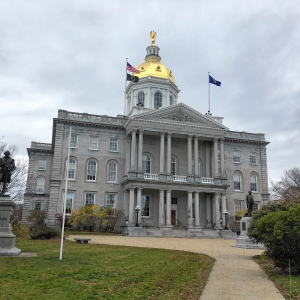Constitutional Connections: The tension between equal protection and religious freedom
| Published: 04-09-2017 12:10 AM |
The Constitution did not become our basic law at a single point in time. We ratified its first seven articles in 1788 but have since amended it 27 times. Many of these amendments memorialize fundamental shifts in values. Thus, it should come as no surprise to learn that the Constitution is not an internally consistent document.
Some of its provisions obviously conflict with others. For example, the Constitution originally advanced the interests of slave owners – and states dependent on slavery – by requiring the return of fugitive slaves and counting slaves as three-fifths of a person for apportionment purposes. Yet the 13th Amendment, adopted at the conclusion of the Civil War, effectively nullified these provisions by banning slavery. The older provisions, although still formally part of the Constitution, are now nothing more than stark reminders of a shameful past.
Other constitutional provisions – even provisions that were simultaneously enacted – protect freedoms that can come into conflict with one another. The First Amendment, for example, promises both freedom from governmental endorsement of religion and freedom from governmental interference with religious practice. But how do these provisions apply when a religious group seeks to use a public facility – say, a public high school auditorium – that is made available for use by other non-religious groups from outside the school?
Must the school turn the religious group away in order to maintain a proper separation of church and state? Or would rejecting the religious group’s application constitute unconstitutional discrimination against religion by the state? The Supreme Court has taken the latter view.
A similar tension exists between the Constitution’s guarantee of equal protection and its promise of religious liberty. The equal protection guarantee provides protection against certain forms of state-sponsored discrimination. Yet the religious liberty principle protects the rights of churches and people of faith to advocate and act on religious beliefs – beliefs that can conflict with freedoms protected by anti-discrimination law.
This tension has heightened as society has moved to extend anti-discrimination protections to persons with a same-sex sexual orientation, to transgender individuals and to other persons who identify as LGBTQ.
The United States Supreme Court has not been clear about whether, under the equal protection guarantee, all discrimination against LGBTQ individuals is to be treated as presumptively unconstitutional. But in 2015, in Obergefell v. Hodges, the court extended the fundamental right of marriage to same-sex couples. This was a huge step forward for those who favor protecting LGBTQ rights, even if the doctrinal basis for the court’s ruling was less than fully clear.
In addition, although Congress has not explicitly protected the LGBTQ community under federal anti-discrimination laws, federal courts and agencies have interpreted existing law to extend at least some protections to members of this group. Indeed, just this week, a federal appeals court in Chicago held that the federal ban on “sex discrimination” in the workplace also applies to discrimination on the basis of sexual orientation.
Article continues after...
Yesterday's Most Read Articles
 Mother of two convicted of negligent homicide in fatal Loudon crash released on parole
Mother of two convicted of negligent homicide in fatal Loudon crash released on parole
 Students’ first glimpse of new Allenstown school draws awe
Students’ first glimpse of new Allenstown school draws awe
 Pay-by-bag works for most communities, but not Hopkinton
Pay-by-bag works for most communities, but not Hopkinton
 Regal Theater in Concord is closing Thursday
Regal Theater in Concord is closing Thursday
 With less than three months left, Concord Casino hasn’t found a buyer
With less than three months left, Concord Casino hasn’t found a buyer
 ‘Bridging the gap’: Phenix Hall pitch to soften downtown height rules moves forward
‘Bridging the gap’: Phenix Hall pitch to soften downtown height rules moves forward
The tension between the equal protection and religious freedom is more vividly on display at the state level.
Following the Supreme Court’s same-sex marriage decision, some states enacted laws designed to protect claims of religious liberty. Mississippi, for example, recently passed a statute authorizing businesses to deny services based on religious opposition to same-sex marriage, extra-marital sex and gender transitions. The law was successfully challenged on the grounds that, among other things, it unconstitutionally denies those discriminated against equal protection of the law. An appeal from this ruling is pending.
Other states, in contrast, have adopted measures that explicitly extend statutory anti-discrimination protections to the LGBTQ community. In several high-profile cases, these laws have been enforced against businesses that refused service to same-sex couples because of religious opposition to same-sex marriage. In these cases, the businesses argued – unsuccessfully – that application of these anti-discrimination laws would deny them their constitutional right to religious liberty.
A 1990 Supreme Court decision, Employment Division v. Smith, has played an important role in causing courts to privilege anti-discrimination claims made by members of the LGBTQ community over competing religious-freedom claims. In that case, the court refused to exempt persons fired from their jobs for illegal drug use during a religious ritual from a state law barring those fired for illegal drug use from collecting unemployment benefits.
The court acknowledged that those challenging the law had used the drugs while practicing their faith. Nevertheless, the court held, a state may enforce a generally applicable prohibition on conduct even when a person engages in the prohibited conduct for religious reasons. Under the logic of this ruling, courts may enforce the federal Equal Protection Clause and federal and state anti-discrimination laws against persons claiming that compliance with such laws intrudes upon their religious liberty.
Looking ahead, will courts continue to harmonize the equal-protection and religious-liberty guarantees in this way? The answer is far from clear. The Smith decision has come under intense criticism since the day it was handed down. Moreover, the Supreme Court contains several members who have expressed concerns that current law devalues legitimate claims of religious liberty. Finally, the court is poised to welcome a new member – Neil Gorsuch – who may well be sympathetic to this view.
Even with the matter of same-sex marriage settled, the tension between the constitutional guarantees of equal protection and religious liberty will almost certainly receive further attention from the Supreme Court.
(John Greabe teaches constitutional law and related subjects at the University of New Hampshire School of Law. He also serves on the board of trustees of the New Hampshire Institute for Civics Education. )
]]>


 Opinion: Adopting the right 306 Rules
Opinion: Adopting the right 306 Rules Opinion: Being and becoming: A good doctor in the age of artificial intelligence
Opinion: Being and becoming: A good doctor in the age of artificial intelligence Opinion: Bankers have the NH Public Deposit Investment Pool in their sights
Opinion: Bankers have the NH Public Deposit Investment Pool in their sights Opinion: Proposed height zoning change for Concord’s Main Street
Opinion: Proposed height zoning change for Concord’s Main Street
